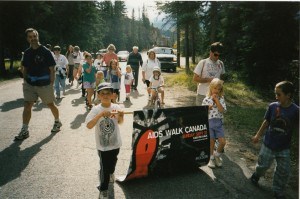
While lying in a hospital bed, with a ventilator strapped to his mouth and nose, Doug Ritchie wrote a message to a visiting friend: āYouāre going to have to help me with this. I have AIDS.ā
The year was 1988 and that friend was Kathleen Waxer, Jasperās director of community and family services.
At the time, Waxer was in the city to talk to and learn from AIDS Edmonton, with the intention of starting a similar organization in Jasper.
The idea had been floated by Family and Community Support Services, after a board member returned home from England, where she discovered HIV/AIDS pamphlets were being dropped off at every household in the country. āShe thought Canada was way behind,ā recalled Waxer.
So the boardāwhich had already spent a great deal of time talking about the need to encourage safe sex amongst Jasperās young adultsāgot to work forming a society. At that time, the main goal was to support people living with HIV and AIDS and to raise awareness about the virus within the community.
āIt all kind of converged at the same time,ā said Waxer, of the FCSS boardās intentions and Ritchieās diagnosis. And from that convergence came the creation of AIDS: A Positive Coordinated Community Response Society of Jasper.
With an exasperated laugh, Waxer explained that the name wasnāt the societyās first choice, but because there are already so many organizations in Edmonton with the words āaidā and āJasperā in them, there were few options. āSo we had to keep adding words,ā she said.
Fortunately, the long-winded name didnāt stick and in later years AIDS Jasper was accepted. Then in 2003, the name changed again, this time to HIV West Yellowhead, opening the organization up to raising awareness and encouraging harm reduction throughout the region.
Following his stay in the hospital, Ritchie, a long-time resident of Jasper who worked at Fairmont Jasper Park Lodge, returned home to live out his last days.
Although, he was worried about openly living with AIDS in such a small town, he decided he wanted his diagnosis to be known throughout the community.
āThatās part of what he wanted me to help him do as a friend: make sure it was known,ā recalled Waxer.
āSo we really had to work hard with the dentist, the hairdressers and the grocery store, so that people knew, but they also knew he wasnāt posing a risk.ā
In the late ā80s, HIV/AIDS was becoming more prevalent and understood, but it still carried a lot of fear and stigma. Many people believed the myths: you can contract the virus by touching the same door knob as someone whoās HIV-positive, by kissing someone whoās infected or by using the same gym equipment.
Ritchie died in 1989. Waxer said she can remember it because she had just had her daughter.
āI went to spend time with him in the hospital and people were criticizing me for doing that because I had this small baby at home and they thought even being in the proximity of death and AIDS was putting the baby at risk.ā
āWe know a lot more now than we did in ā88 when there was mass hysteria and it was totally unknown,ā said Karly Savoy, prevention and education co-ordinator for the organization. But even with greater awareness, she said she continues to hear people express their fear of toilet seats and door knobs.
Thatās why HIV West Yellowhead, and its predecessors, made education and awareness a main focus of its work. The organization visits schools, sets up displays at orientation nights, distributes condoms at the bar and plasters the town with fun educational posters that encourage responsible sexual behaviour.
It also hosts guest speakers, organizes film nights, provides referrals to sexual health nurses and offers a safe space for people to pick up literature on sexual health, as well as condoms, dental dams and lube.
In 2003, the organization expanded its reach to the region, servicing Whitecourt, Edson and Hinton, as well as Jasper, and in recent years it has used that reach to complete a needs assessment for the region.
That assessment, which is not yet public, was developed to determine whether a needle exchange and harm reduction program is needed in the region.
In an interview on Monday, Andrea Quick, HIV West Yellowheadās executive director, said the assessment has proven that need.
āOf the 20 people that were interviewed for [the assessment], four were HIV positive and nine were Hep C positive, and thatās just the 20 people who did the needs assessment around injection drug use,ā she said, referring to people interviewed from across the region. āSo thatās where the organization is heading, to continue doing work around positive prevention messaging, client care and support and needle exchange and harm reduction services.
āBut Iāll tell you, thereās a lot of stigma and discrimination out there. This is not going to be an easy process.ā
But thatās nothing new for the organization.
Over itās 25 year history, it has met adversity head on, each time bringingwith it a message of prevention and harm reduction.
Nov. 25 marks the beginning of Canadian HIV/AIDS Awareness Week. Dec. 1 is World AIDS Day and Dec. 1 through Dec. 5 is Aboriginal AIDS Awareness Week. To mark these weeks, HIV West Yellowhead will be hosting events, including a workshop, titled Beyond the Basics, on Nov. 25. There will also be an entire weekās worth of events taking place at Fairmont Jasper Park Lodge.
Nicole Veerman
[email protected]
